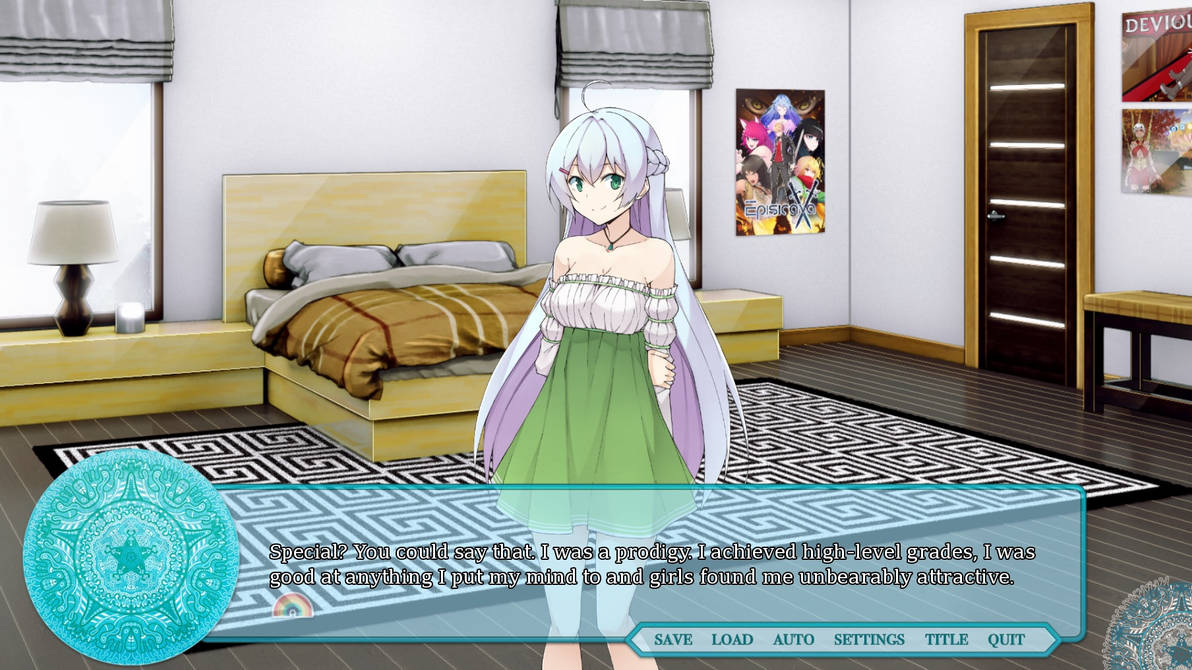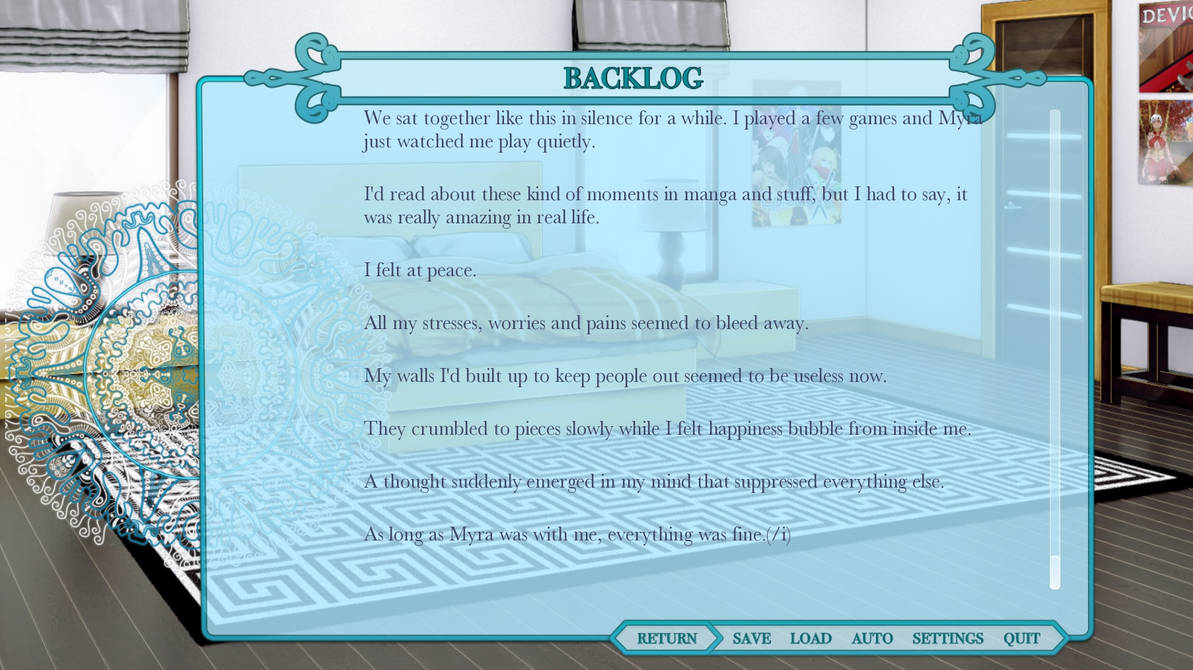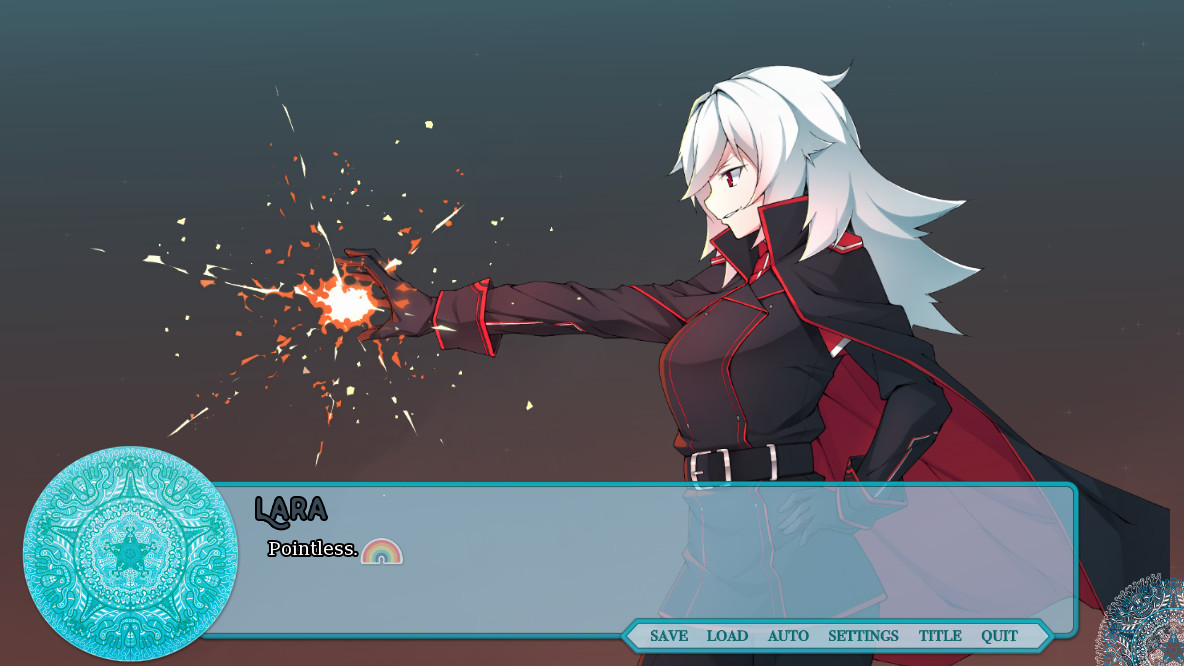
Epic
Works is a pretty unique phenomenon in the EVN scene: an African studio, developing games openly inspired by Type-Moon's visual novels and other classic chuunige. Their first release, Episicava, was something of a glorious trainwreck,
launching with multiple technical problems and borderline-unbearable,
edgy storytelling replicating most of the worst tropes of the chuuni game subgenre. The follow-ups included an unholy abomination of a nukige known as Analistica Academy, and a clunky and inconsistently written, but occasionally appealing RPG VN The Adventurer’s Tale.
None of them proved genuinely impressive, but each showed some forms of
progress, particularly in the visual department, which by the time of The Adventurer’s Tale’s release got both appealing and consistent in style and quality.
As unhealthy curiosity is one of the driving forces behind my blogging endeavours, I couldn’t stop myself from being attracted by the studio’s latest Kickstarter campaign, aimed at creating another chuunige-style VN
in the Episicava universe (although with no direct connection
to the latter’s main plot). Despite my disappointment with their debut titles, I was very interested whether this new project, Rainbow Dreams,
would represent an improvement for the studio and correct the massive
issues with the tone and writing quality those earlier games suffered from.
And despite apparent development issues and heavy delays, resulting in a January 2020 Steam release (7 months after the initial goal), I’m happy to
say that while not all problems were remedied to an appropriate degree, when it comes to the sheer entertainment factor, Rainbow Dreams is a major step in the right direction.

As
usual, the Epic Works newest protagonist is not exactly balanced, but
at least his attitude is a lot more bearable than that of his
predecessors
The story of Rainbow Dreams
is the most straightforward power and romantic fantasy imaginable: an immensely talented, but troubled teen, Luka, is suddenly approached by a girl claiming to be the god of his universe. Nearly as soon as they
meet, she reveals that the protagonist is her soulmate and fellow god,
created by an accident millennia ago, and that she left the heavens to
become his partner. And while you can’t go much higher when it goes to
power levels and convenience for the main character, there’s also a
problem: while the goddess, Myra, is benevolent and don’t waste time
showing her power by changing the protagonist’s life for the better, the
most powerful of her servants, Lara, hate the mortal races and will do
anything to eliminate him and keep her influence over the goddess. To
prevent that from happening, Luka will have to open his heart, learn to
use his newfound powers and understand the link that binds his and
Myra’s souls together.
The fact the story is straightforward doesn’t mean that its execution was done without hiccups, mostly drawing from the fact the game was too
short for some of its ideas to be fully fleshed out. This means that
some of the secondary story elements and characters show up and they
aren’t utilized in a meaningful way or don’t get explored beyond the
bare minimum. The most striking example is the witch that shows for
literally one scene, subtly aiding the protagonist and leaving him with a
vague warning that doesn’t match anything happening later in the story.
These problems make the universe of Rainbow Dreams feel a lot less robust than that of Epicisava
and underline the general impression that the game was downscaled from
the team's original ambitions. There’s also the issue of “meaningful
choices” promised in the Kickstarter campaign, which also very likely
got scrapped during the development process: the three choices that made
it to the game are so pointless that it would seriously be better off
being a kinetic novel.

As many lines in this game will show you, the quality control it received was not exactly “fine(/i)”
Characters
are a mixed bag: while the main couple has some things going for them,
the supporting cast differentiates between paper-thin and obnoxious,
with pretty much two exceptions. The protagonist, Luka, represents a
similar misanthropic, overconfident asshole archetype as the Episicava's
MC, but thankfully toned down to bearable levels: as jaded and arrogant
as he might be, he cares a lot about those close to him and avoids
pointless violence. He also warms up to Myra pretty quickly, masking his thoughts with a nasty attitude, but never truly ignoring her feelings
and taking things around him with proper consideration. Myra herself
poses for a spoiled, naïve princess that left her divine realm on a
reckless adventure, but shows a lot more depth when the perspective
switches to her, or when the stakes get high. Both of these could become
truly compelling characters if the game took more time developing them
and its writing was more consistent, but they’re serviceable nonetheless
and their bickering makes for some fun slice-of-life moments. Whether
the cartoonishly-vile villain, Lara, works for you is probably up to
personal taste, but I found her at least properly menacing – an insane
demigod terrorizing the mortal races by manipulating the goddess is a pretty compelling idea, even if the “mad” part is showed in the game a
lot more than brilliant scheming. Also, most of her screentime is
connected with another decent character – demon Cardea, who combines an
aloof, carefree Façade with a lot of wit and battle prowess gathered
over her centuries-long life.
Those that are familiar with Epic Works games will probably know that they’re not free of some weird, questionable elements and in this respect, I have a few, probably most important warnings for those interested in buying Rainbow Dreams. While the game suffers from an unpolished script, with fairly frequent typos and often awkward
English, some storytelling choices also made me scratch my head. Maybe
the most glaring one is Trica, Luka’s best friend who half-jokingly
flirts with him in every interaction, spewing heavy-handed gay "jokes" and
receiving similarly uncomfortable (that is, borderline-bigoted)
responses. Whether you’re sensitive to such stuff might decide whether you’re going to have an enjoyable time with this VN in general.
Thankfully, the actual romance subplot between Luka and Myra is much
more balanced, with a decent amount of agency and respect on both sides.
This also extends to the game’s two sex scenes, which are pretty
vanilla and strongly connected to the romance progression, rather than
showing up as random fanservice (also unlike Episicava, where at least one scene was a pretty awful insert, pointlessly disrespecting one of that game’s strongest female characters).

The
game’s fighting sequences aren’t necessarily thrilling, but they also
never overstate their welcome or show up without a proper reason
Rainbow Dream’s
biggest strength, however, lies in its visuals – the general artstyle
is gorgeous and while most of the story is showed through sprites, the
CGs that are present have enough variants and look good enough to create
a relatively dynamic experience. The weakest part of it all is
probably fighting scenes, which mostly rely on a small set of
frequently-reused illustrations, but they aren’t an as big part of the
experience as they’re in an average chuunige, and the flow of the
battles (as it is presented through text) is pretty unique each time.
The music is pretty upbeat most of the time, matching the relatively lighthearted tone of the story, although it can get intense in the
dramatic moments – none of it is particularly memorable, but it does its
job.
In summary, Rainbow Dreams is
a serviceable VN – it does not rise to excellence in any department and
has a good number of issues big and small, but also manages to be just
enjoyable enough to justify its existence. With 5-6 hours of content and
already mentioned lack of polish, one could argue whether it’s worth
the $10 price tag, but I’d have no issues to recommend giving it a
chance when it goes on sale. And despite not being that impressed with
it, I’d still be happy to see it get some recognition and encourage Epic
Works to continue working on their VN formula and their skills as
developers – more diversity is never a bad thing and the chuunige niche
in EVNs is distinctly underdeveloped. Whether the relative lack of
interest for their latest releases prevents that, only time will tell…
Final Rating: 2,5/5
Pros:
+ High-quality visuals
+ Fun, straightforward main plot
Cons:
– Unpolished script
– Underdeveloped/forgotten story threads
– Weird/questionable moments
– Choices are not just meaningless, but pointless
VNDB Page
Buy Rainbow Dreams on Steam or Itch.io
